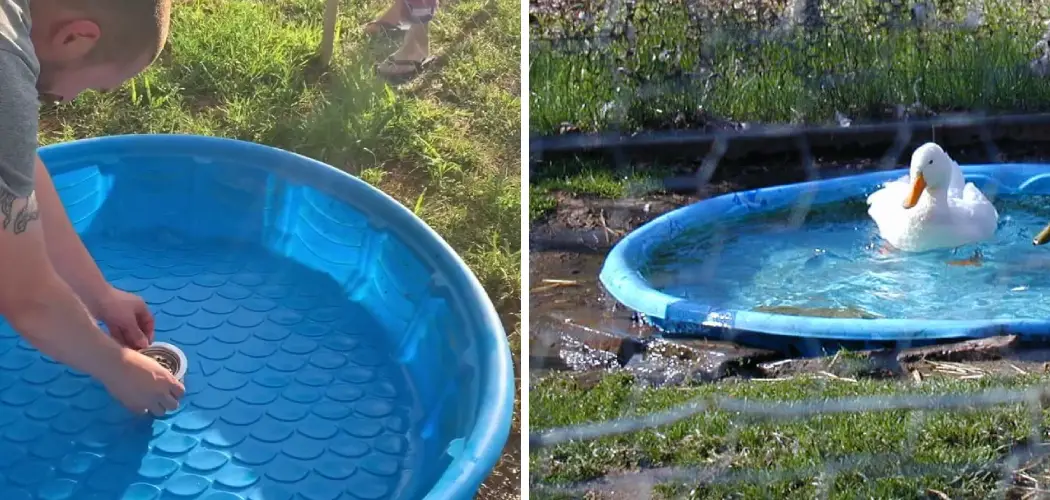Are you thinking of getting a pet duck and want to keep its living environment squeaky clean? Or do you already have a duck pool in your backyard but need help cleaning it up? Ducks are excellent pets that bring tons of fun and love into our lives, so as their owners, it’s essential for us to ensure they’re getting proper care.
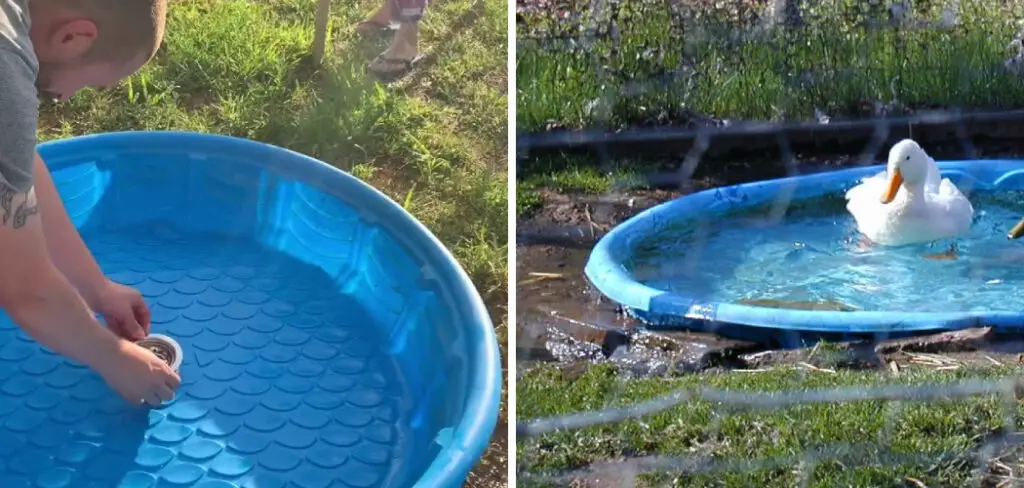
How to keep a duck pool clean is an essential part of making sure your pet stays healthy and happy – luckily, there are some simple steps that anyone can take! In this blog post, we will go over how to keep a duck pool sparkling clean – from periodic maintenance (like changing the water) to methods for dealing with algae growth.
No matter your current situation or expertise in caring for ducks, this post has covered you!
What Will You Need?
Before we dive into the specifics, let’s look at what you’ll need to get started. Here are some basic supplies that will come in handy when keeping your duck pool clean:
- Pool skimmer net
- Duck-safe cleaning products (more on this later!)
- A garden hose or pressure washer
- A brush with stiff bristles
- Algae scraper/magnifying glass
- A pair of rubber gloves (for those with sensitive skin)
Having these essential tools at hand will make the cleaning process much easier and more efficient, so it’s a good idea to have them ready before starting.
10 Easy Steps on How to Keep a Duck Pool Clean
Step 1: Regularly Change the Water
The first step in keeping a duck pool clean is regular water change. Ducks tend to dirty the water with food, feathers, and waste. Therefore, it’s essential to empty the pool and replace it with fresh water frequently. Depending on the number of ducks and the pool size, you might need to change the water daily or every few days. Remember to use a garden hose or a pressure washer to make the process quicker and easier.
Step 2: Skim the Pool Regularly
In addition to changing the water, regular skimming is a must. Use a pool skimmer net to remove debris like leaves, twigs, feathers, and other miscellaneous.
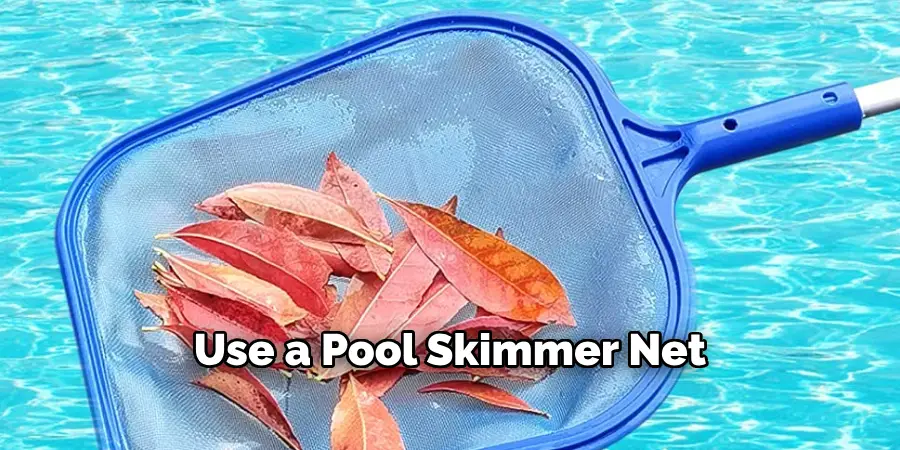
Skimming not only keeps the pool looking clean but also prevents the buildup of decaying organic matter that can lead to algae growth. Aim to touch the pool at least once a day, but more often if your pool is under a tree or if your ducks are molting.
Step 3: Scrub the Pool
Over time, there may be a buildup of algae or other forms of grime on the sides and bottom of the pool. Scrubbing the pool with a stiff-bristled brush can help remove this buildup and prevent slippage.
Use a duck-safe cleaning product to assist in removing stubborn grime. Always rinse the pool thoroughly after scrubbing to ensure all cleaning product is washed away before refilling the pool. Doing this once a week should keep your duck pool clean and safe for your feathery friends.
Step 4: Treat the Water
Treating your pool water is another effective way to keep the pool clean and safe for your ducks. There are various types of treatments available on the market, so it’s essential to choose one that is safe for ducks. Some treatments can help in reducing algae and bacteria growth. Always ensure to follow the instructions on the label. Most treatments require waiting a certain amount of time before allowing the ducks back in the water.
Step 5: Cover the Pool
When not in use, especially overnight, consider covering your duck pool. This can prevent debris from falling into the water and making it dirty. Using a pool cover will significantly reduce the required cleaning and keep the water cleaner for longer.
Step 6: Monitor for Algae Growth
Algae can quickly become a problem in duck pools, especially during warmer months. Regularly check for signs of algae growth, such as green tinges in the water or slippery surfaces. If you notice any signs, use an algae scraper or a stiff-bristled brush along with a duck-safe cleaning product to remove it.
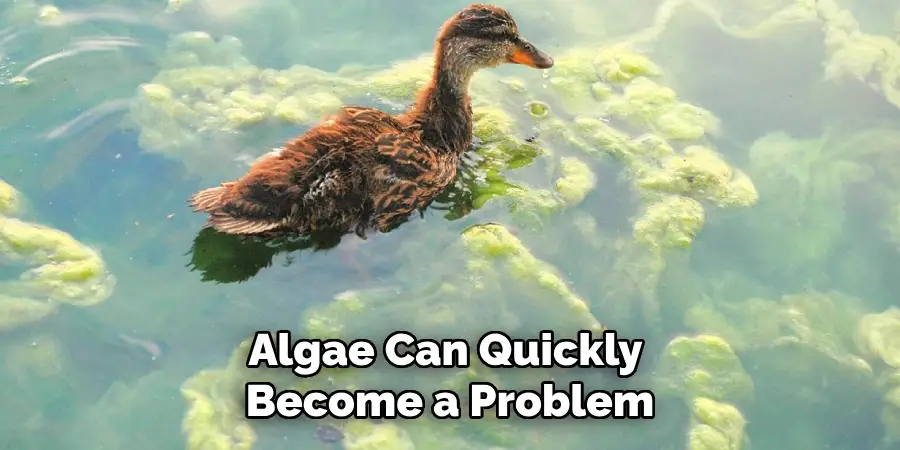
Additionally, using a magnifying glass can help you spot early signs of algae growth so you can deal with it before it becomes a more significant issue.
Step 7: Use a Duck-friendly Filter
To keep the water in your duck pool clean for more extended periods, consider investing in a duck-friendly filter. Filters designed explicitly for duck pools help remove impurities and clear water. However, not all filters are safe for ducks, so be sure to choose one that is specifically designed for use in duck pools. This is especially important if you have a larger pool or a larger flock of ducks, which may make regular water changes more challenging.
Step 8: Maintain a Regular Cleaning Schedule
One of the most effective ways to keep a duck pool clean is by maintaining a regular cleaning schedule. Consistency is key in pool maintenance. This schedule can include daily, weekly, and monthly tasks such as changing the water, skimming the pool, scrubbing the sides and bottom of the pool, and checking for algae growth. By sticking to this routine, you can ensure that your duck pool remains a healthy and enjoyable environment for your ducks.
Step 9: Provide a Pre-Pool Cleaning Area
Consider setting up a pre-pool cleaning area where your ducks can get cleaned up before they enter the pool. This area could include a small bucket or tub filled with water where ducks can rinse off debris and dirt from their feathers. It can also serve as a drinking area for the ducks. This will not only reduce the amount of dirt and debris that ends up in the pool but also prolong the cleanliness of the pool water.
Step 10: Keep Ducks Healthy
Lastly, keeping your ducks healthy can go a long way in maintaining a clean pool. Healthy ducks are less likely to introduce diseases into the pool. Regular veterinary check-ups, a balanced diet, and a clean living environment all contribute to the overall health of your ducks. A healthy duck is a pure duck!

By following these simple steps, you can maintain a clean and healthy pool environment for your ducks. Remember, a clean pool contributes to the overall well-being and happiness of your feathered friends.
5 Additional Tips and Tricks
- Regularly check and adjust the pH levels of your duck pool. Ducks prefer slightly alkaline water with a pH between 7.2 and 8.2.
- Invest in quality pond filters to help keep the water clean and clear. This will also reduce the amount of manual cleaning you have to do.
- Keep a watchful eye on any plants or vegetation growing around your duck pool. If left unchecked, they can quickly become an eyesore and create a potential health hazard for your ducks.
- Remove any debris or fallen leaves from the surface of the pool. This not only keeps it looking clean but also prevents clogging in filters and pumps.
- Consider using a natural water clarifier or beneficial bacteria solution to help break down organic matter and keep the water clean and free of harmful bacteria.
These additional tips and tricks can help you maintain a healthy and clean environment for your ducks to swim and play in.
5 Things You Should Avoid
- Avoid Overfilling the Duck Pool: Keeping water levels optimal ensures the pool doesn’t overflow when your ducks jump in, which could cause unnecessary mess and additional cleaning.
- Don’t Ignore Algae Growth: Algae can make the pool water unhealthy and slippery for your ducks. Regular cleaning and proper maintenance can prevent algae growth.
- Don’t Use Harsh Chemicals: Avoid using strong chemicals or bleach to clean your duck pool, as they can harm your ducks’ delicate skin and eyes. Opt for natural methods and products instead.
- Avoid Overcrowding: Overcrowding the pool with too many ducks can lead to an accumulation of waste and bacteria, making it challenging to maintain clean water.
- Remember the Surroundings: Ensure that the area around the duck pool is kept clean and free of any potential hazards for your ducks. This includes regularly removing any sharp objects or debris from the ground.
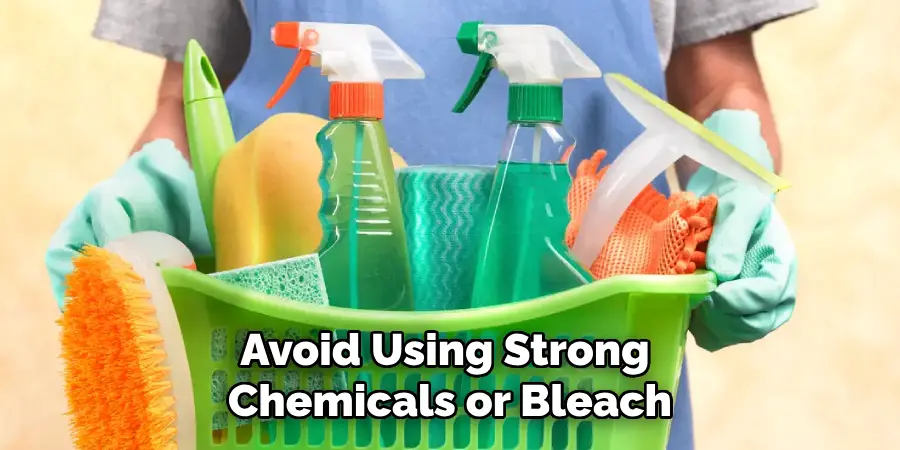
Following these additional tips and avoiding common mistakes, you can easily keep your duck pool clean and create a safe and enjoyable environment for your feathered friends. Remember, a pristine pool not only benefits your ducks but also adds to the overall aesthetic of your backyard or farm.
Why Does Duck Water Get So Dirty?
It’s important to understand why duck water gets dirty to maintain a clean pool effectively. Ducks are naturally messy creatures as they constantly preen and forage in the water, releasing droppings and stirring up sediment.
Additionally, bacteria, algae, and other microorganisms can thrive in stagnant or poorly maintained water, making it unsafe for your ducks to swim in. By regularly cleaning and maintaining your duck pool, you can prevent these issues and provide a healthy environment for your ducks to thrive in.
Overall, keeping a duck pool clean requires regular attention and maintenance, but the end result is worth it for happy and healthy ducks.
Conclusion
How to keep a duck pool clean is essential to ensure the safety and health of your ducks. Unless you’re experienced in domestic animal care, it’s best to hire a professional for regular maintenance and cleaning tasks. With that said, there are a few things you can do by yourself to help reduce odors, promote water clarity, and minimize the risk of bacteria or viruses.
Daily, skimming debris off the water’s surface will go a long way toward keeping the duck pool cleaner for extended periods. Also, keep up with excess vegetation growth by cutting back plants as needed. Finally, test pH levels and chlorine concentrations regularly – at least once weekly if necessary – using an inexpensive tester kit from the store. Combining these things will lead to a much more enjoyable outdoor experience for your feathered friends!
So take some time today to create a healthier home environment for your beloved ducks – they’ll thank you for it!
About
Outdoor Fixes is a distinguished figure in the world of Diy design, with a decade of expertise creating innovative and sustainable Diy solutions.
His professional focus lies in merging traditional craftsmanship with modern manufacturing techniques,
fostering designs that are both practical and environmentally conscious. As the author of diy,
outdoorfixes delves into the art and science of outdoorfixes-making, inspiring artisans and industry professionals alike.
Education RMIT University
(Melbourne, Australia) Associate Degree in Design (Outdoor Fixes) Focus on sustainable design, industry-driven projects,
and practical craftsmanship. Gained hands-on experience with traditional and digital manufacturing tools, such as CAD and CNC software.
Nottingham Trent University
(United Kingdom) Bachelor’s in outdoorfixes.com and Product Design (Honors) Specialized in product design with a focus on blending creativity with production
techniques. Participated in industry projects, working with companies like John Lewis and Vitsoe to gain real-world insights.
Publications and Impact
In diy, Outdoor Fixes his insights on indoor design processes, materials, and strategies for efficient production.
His writing bridges the gap between artisan knowledge and modern industry needs, making it a must-read for both budding designers and seasoned professionals.

